Best Pocket WiFi for Vietnam: Rent, Buy or Alternatives
Pocket WiFi for Vietnam travel is one of popular connectivity options for travelers. But, there are many things to consider before deciding to use this method. Here we explain in detail.
When traveling to Vietnam with family and friends, staying conect is important for communication, navigation, translation, sharing memories and more. Pocket WiFi is a popular option for staying online with multiple devices. But, is it the right choice for everyone?
This article covers everything you need to know about using pocket WiFi for Vietnam travel, including different types available, prices, rental locations, and more.
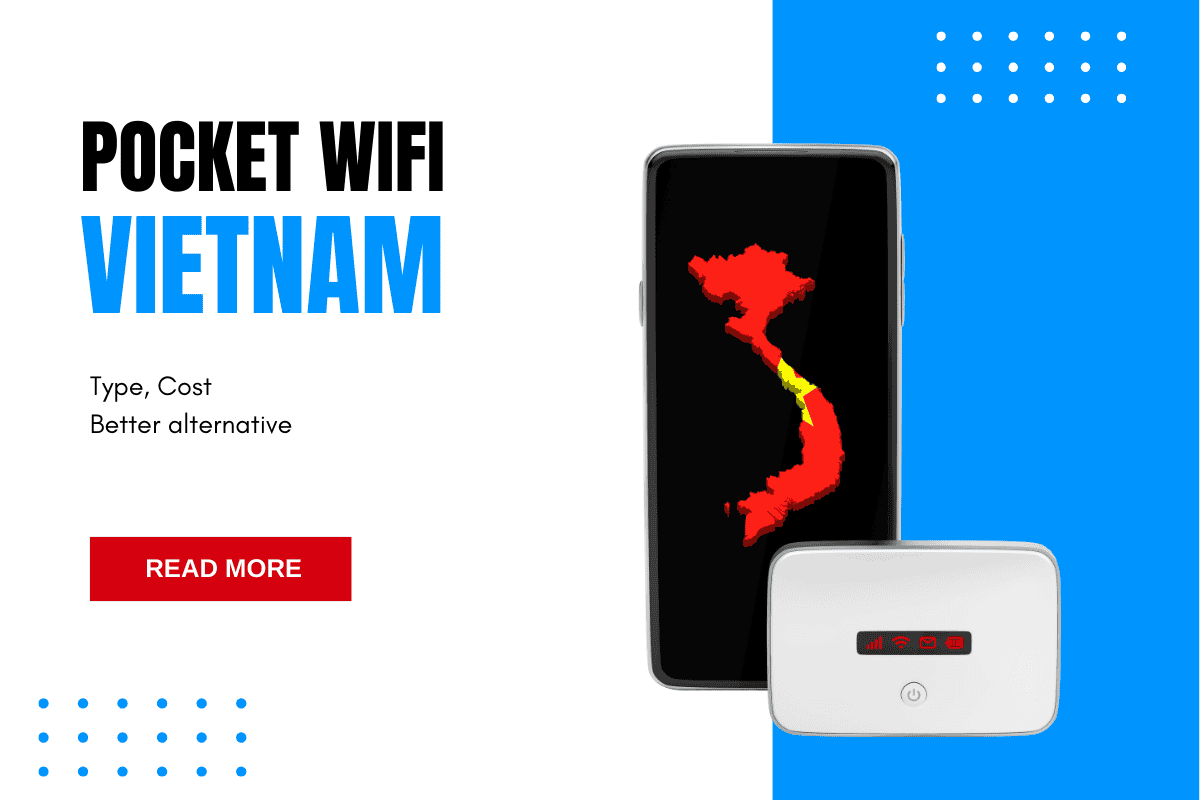
I. What is pocket WiFi (for Vietnam)?
A pocket WiFi is a tiny, portable router with a SIM card slot inside. It requires a SIM card with a data plan to connect to the Internet. This device acts like a mini WiFi station that you can carry around easily, small enough to fit in your pocket. It creates a personal WiFi network just for you and your nearby devices.
Specifically for Vietnam, portable WiFi is a device that:
- Connects to Vietnam’s local mobile networks. It uses Vietnam SIM cards from local mobile operators (like Viettel, Vinaphone, and MobiFone) to access the 4G LTE or 3G Internet.
- Creates a private WiFi hotspot: You can connect your mobile device like phone, tablet, laptop or any WiFi-enabled device device to this network.
- Offers internet access on the go: You can carry it out along when exploring Vietnam, ensuring you stay connected wherever you go in Vietnam.
How many devices can a pocket WiFi share Internet access?
The number of devices a pocket WiFi can share internet with varies depending on the specific pocket WiFi model. A basic portable WiFi device can handle from 5 – 15 devices at the same time. High-end models can handle up to 20 devices concurrently. This sharing capability does not depend on geography but model.
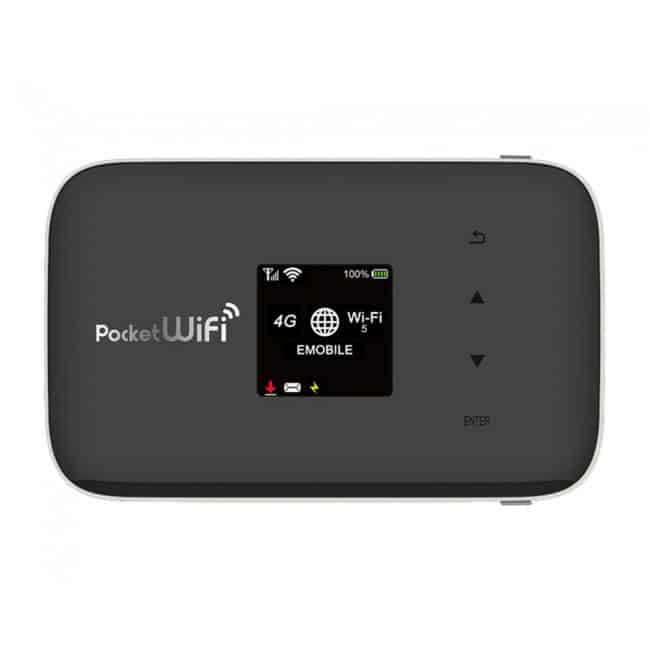
II. Should I use pocket WiFi for Vietnam?
It depends on your travel needs. A pocket WiFi device will be an ideal option for you if:
- You travel with family or friends and need to share the Internet with other devices. Sharing the Internet through a pocket WiFi with multiple devices will often be cheaper than everyone buying a SIM card or paying for roaming charges.
- You will visit remote areas. While the 4G network in Vietnam is extensive, some remote areas may not receive enough signals. Pocket WiFi devices are often designed with more powerful antennas, compared to phones, thereby potentially providing more than your phone, thereby providing more reliable connectivity in less-developed regions.
So, generally, if you generally prioritize consistent connectivity, travel with companions and want a hassle-free way to stay online, a pocket WIFi will be helpful for your adventure in Vietnam.
However, it is better to consider the benefits and other factors like budget, data usage, and technical comfort level over other connectivity options like local SIM cards and eSIMs.
III. How to get pocket WiFi for Vietnam
You have 02 options to get a pocket WiFi for using in Vietnam: rental and purchase.
1. Rentals (Convenient)
This is the most popular and convenient option for short-term travelers. When you rent, you will get both the device and the SIM card plan to use with that device.
You just need to select the ranges of day for usage, pay, wait for the device to be delivered, enjoy it, and return it via prepaid mail or return points. But, you will be charged a fine if the device is damaged or lost.
You can rent a pocket WiFi device from:
- Online rental companies like TravelWifi, Skyroam, iVideo, or Klook. They offer both delivery and pick-up options.
- At the airport: after arriving at international airports in Vietnam, you can find kiosks and counters that offer pocket wifi rental services. The price is slightly more expensive than other options.
- Local shops in Vietnam cities: You can also find shops offering rental services in big cities like Hanoi, Ho Chi Minh city or tourist areas. Remember to research and compare prices in advance.
It is advised to choose a provider with services like airport pick-up/drop-off, or hotel delivery for the most convenience.
2. Purchase (Long-term travelers)
Buying pocket WiFi device is suitable for frequent travelers to Vietnam or those on long-term stays. But, you need to buy a local Vietnam SIM card data plan also separately to use with the device.
This method will help you save money for each day of use. You just need to book online, pay, then wait for delivery to your home, office, hotel or other requested delivery points. Follow the instructions to activate the device and enjoy it without limits.
You can buy a pocket Wifi device from:
- Online marketplaces like Shopee, Lazada, Amazon.
- International providers like Traveloka, Miowifi, etc.
Notes:
- Check carefully to make sure it is compatible with Vietnamese networks.
- Frequent travelers tend to make more than 5 trips a year.
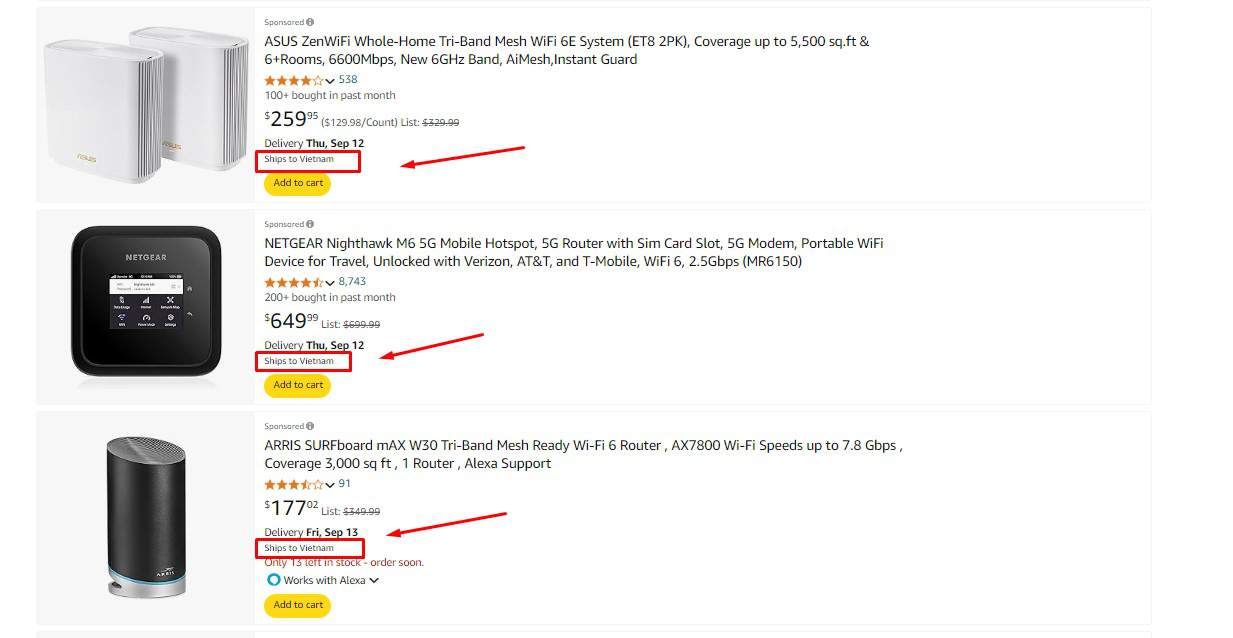
IV. How much does a pocket WiFi for Vietnam cost?
This varies depending on factors like method to get (rent or buy), days of use, and specific providers.
You should expect to pay from $4 – $8 USD per day for pocket rental in Vietnam.
On the other hand, buying a pocket WiFi device outright will typically cost from $50 USD – $199 USD or more, depending on the brand, features and data capabilities.
V. How to choose the right pocket WiFi device for Vietnam?
Understanding your needs is crucial when selecting a pocket WiFi device for your Vietnam trip. Three major factors to consider are: data usage, coverage area, and budget.
1. Data usage
Estimate your daily data usage, consider how often you will use data-heavy services like streaming, navigation, social media, and video calls.
Then, choose unlimited data if you are a heavy user or traveling with a group. If you are a light user, choose a plan with a generous data allowance
Remember to check for fair usage policies because some labeled “unlimited” plans throttle speeds after a specific data threshold.
Note that some providers offer data rollovers, which can be beneficial if you do not use data all day long.
2. Coverage area
You need to choose the pocket wifi provider with good coverage in the areas you will visit in Vietnam. For example, if you plan to trek through the mountainous Sapa region, you will need a provider with a strong track record of coverage in remote, high-attitude areas.
If you plan to travel around major cities like Hanoi, Ho Chi Minh city, and Da Nang, most providers can offer reliable coverage. However, do not solely rely on advertising statements about “nationwide coverage”. Check reviews and testimonials first.
3. Budget
How much are you willing to pay for a pocket WiFi? Which method do you choose to get the device?
Consider rental vs. Purchase. Each method has different cost affecting factors:
- Rental: the cost will depend on daily rates, rental duration, data plan, rental provider and even rental location (e.g airport, online, city centers).
- Purchase: the cost will include the price of a pocket wifi device and a sim card data plan.
VI. Which is the best Pocket WiFi provider for Vietnam?
Below are top pocket wifi providers for Vietnam travel:
1. Travel WiFi
TravelWiFi is a company based in Spain providing global mobile WiFi solutions. It offers both WiFi hotspot rentals and purchases for Vietnam.
There are 03 options to choose from:
- Sapphire 3 Portable WiFi Hotspot: purchase at $149
- Sapphire Power Portable WiFi Hotspot: more powerful, purchase at $179.
- Portable WiFi Hotspot Rental: provides flexibility, rental prices vary by data allowance:
- 1GB/day costs $ 7.95/day
- 2GB/day costs $ 9.95/day
- 5GB/day costs $12.95/day
For delivery, your pocket WiFi for Vietnam can be shipped no matter where you are.
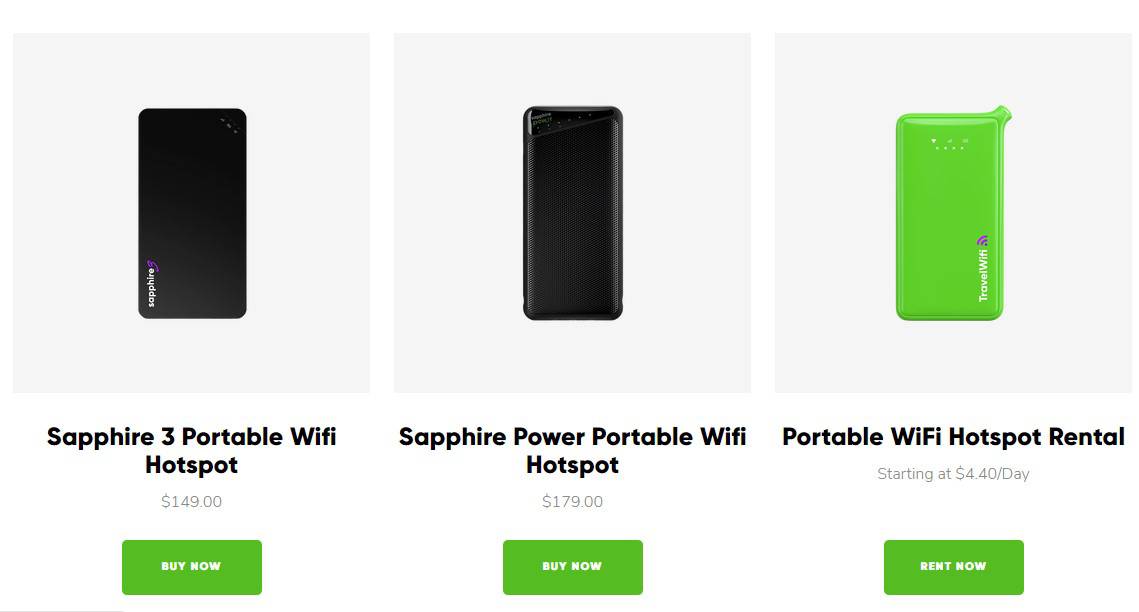
2. MioWiFi
MioWiFi is a pocket wifi provider that delivers unlimited high speed 4G mobile internet access in Vietnam. Using this portable wifi, you can connect to the best mobile networks in major tourist cities in Vietnam like Hanoi, Ho Chi Minh, Nha Trang, Danang, etc.
MioWiFi offers 02 options: renting and buying.
- Renting: The cost of renting is $8 USD. You only pay for the time you use it. Also, the provider will not charge for delivery and return days before and after your travel. The device will be sent to you within 3-5 working days before your trip and you must return it 3 working days after your trip.
- Buying: There is only one device for purchase, named MioWiFi Global Hotspot R10, which costs $199 USD. Once you make a payment, you will receive a username and password to access your account where you can activate the device with unlimited Internet days. It is easy.
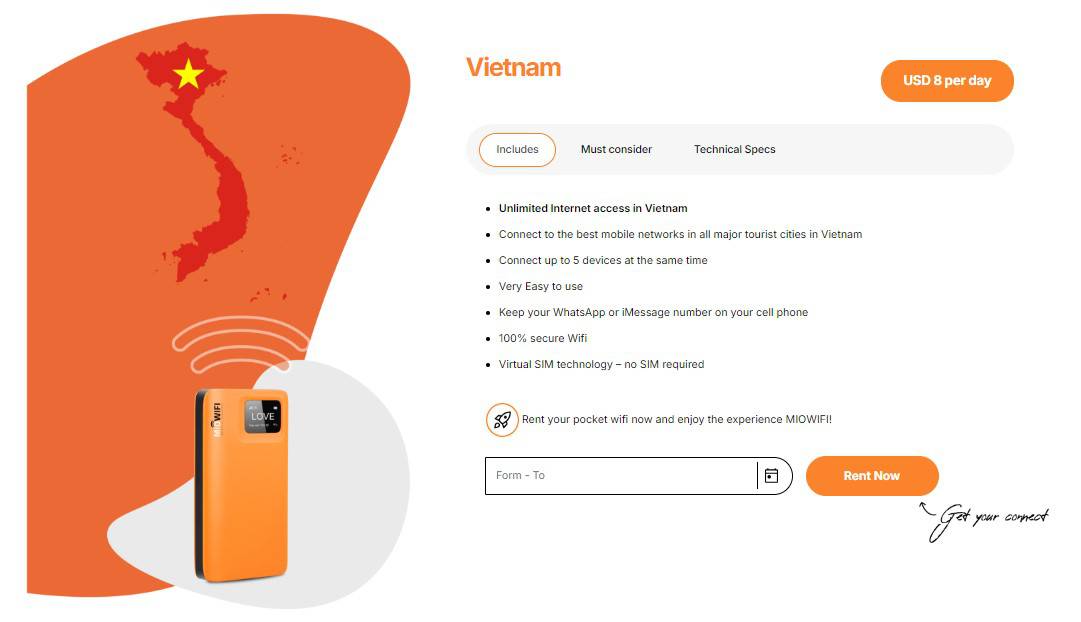
3. Solis Pocket WiFi
Solis Pocket WiFi has two options for people to use their pocket wifi device: renting and buying outright.
If you go on a short trip (a few days) or constant travel, you can rent your device for a short plan. If you go on a long trip, or if you prefer, you can buy it.
You can get your own private, secure, and portable WiFi connection wherever you go in Vietnam. After paying, you create your account and connect a hotspot. Next, choose your desired plan by the data allowance, or by the day or month. Finally, you can enjoy WiFi anywhere in Vietnam. A good thing is that it includes useful VPN service (optional).
There are a number of products to choose from on Solis pocket wifi’s website.
For example, the Solis Lite Hotspot & Power Bank costs $159.
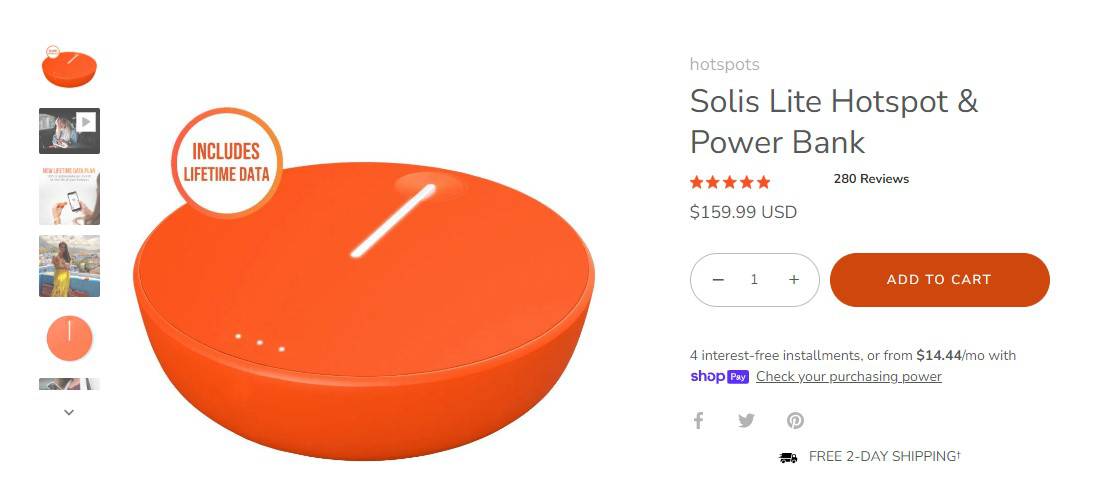
Thereafter, you can pay for days of use, starting from $5. Or, you can also select their monthly plan.
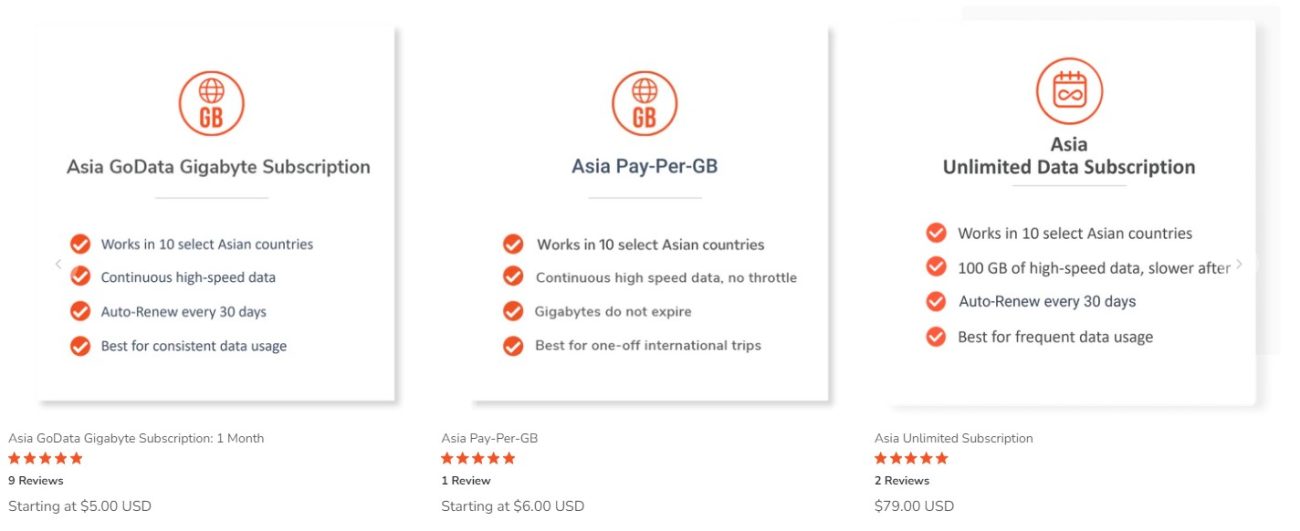
Thereafter, you can pay for days of use, starting from $5. Or, you can also select their monthly plan.
4. My Webspot
Based in Switzerland, My Webspot also prices its product similarly other competitors. But, note that they only offer 3GB/day. Therefore, if your daily data usage is more than that, you should not choose this provider.
The daily cost for renting a pocket WiFi is about $10.90. If you rent the device for one week (7 days), it costs about $84.6.
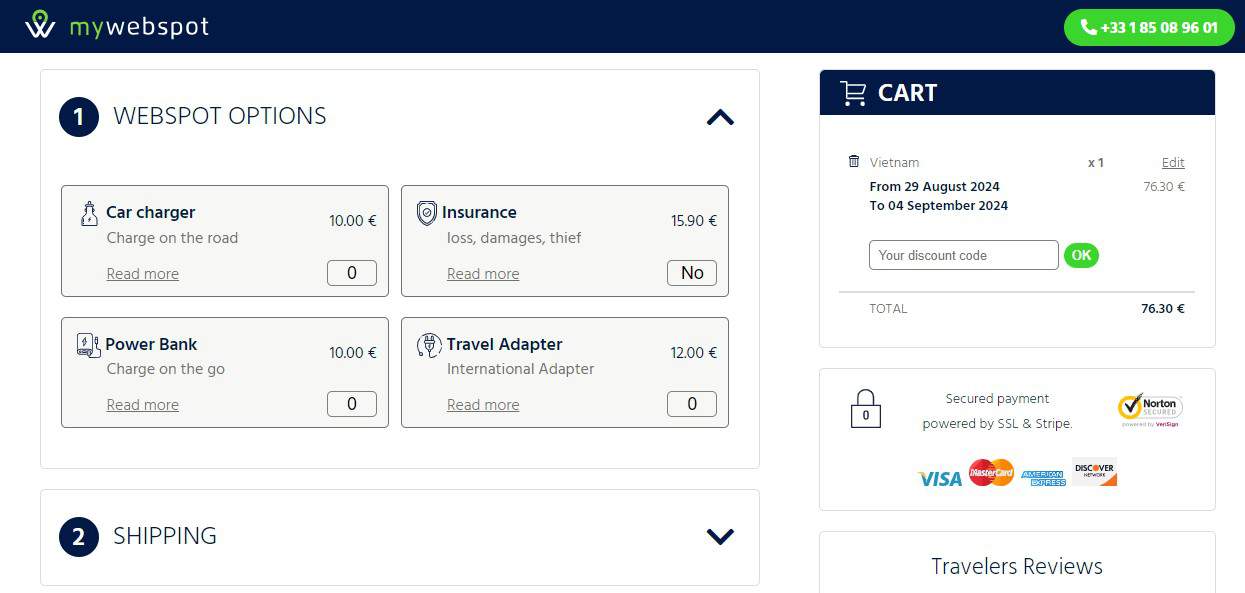
VII. Pocket WiFi vs Alternative Connectivity Options for Vietnam
Though pocket WiFi is suitable for sharing the Internet with multiple devices, it seems to be too expensive to fit various travelers’ budgets.
There are other alternative options that you can consider, such as eSIM and SIM cards for Vietnam.
1. Data eSIM for Vietnam
eSIM is a digital SIM card embedded directly on the phone’s mainboard. This eliminates the need for a physical SIM card and allows users to activate a data plan remotely. eSIMs are convenient, flexible, and cost-effective.
If you travel to Vietnam, the best alternative to pocket WiFi is the eSIM plans from Vietnamesim.com. There are multiple plan options tailored to different needs and budgets, starting from just $8.9. You can choose from various data allowances and validity periods to best suit your travel plans. If you need to make calls during your stay (to book grab, order food, book restaurant, etc.), you can choose a plan with phone number.
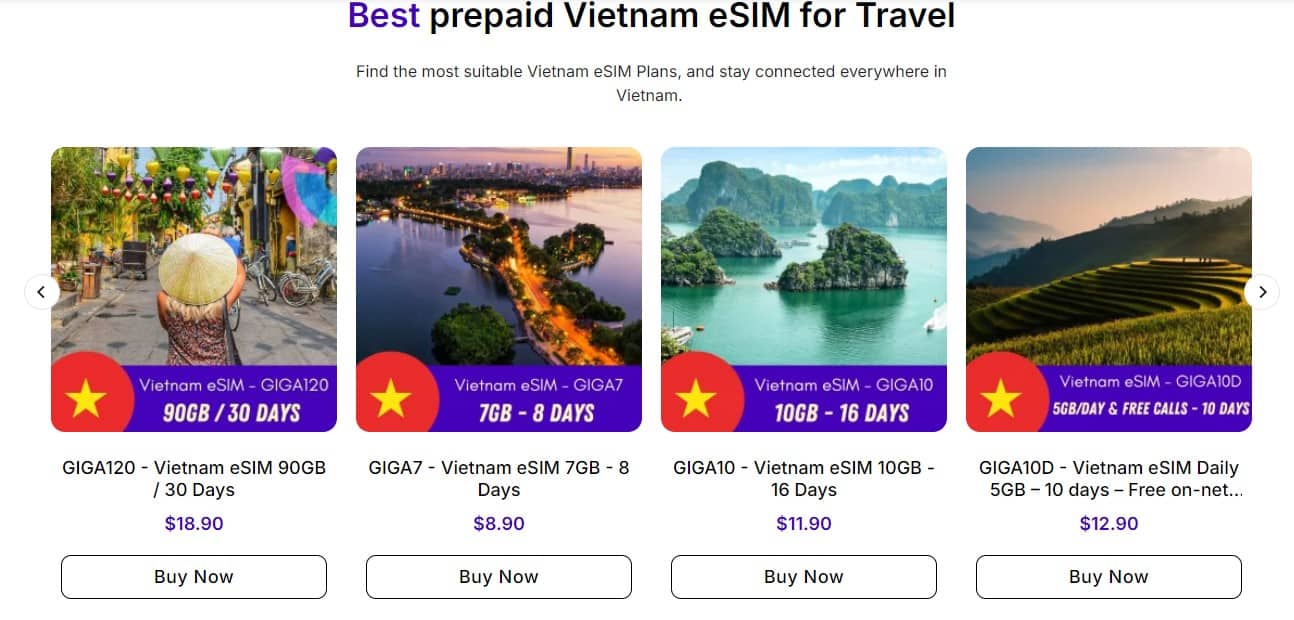
However, before buying an eSIM for Vietnam, make sure that your phone is eSIM compatible. You can find a comprehensive list of compatible devices here.
2. Prepaid SIM cards for Vietnam
Prepaid Vietnam SIM cards are widely available in Vietnam at airports, convenience stores, and mobiphone shops. They offer a relatively affordable way to stay connected with phone numbers or data only. However, if you buy prepaid SIM cards in Vietnam, you need to present a passport.
3. Free WiFi
Free WiFi is readily available in many places in Vietnam, such as hotels, cafes, restaurants, and shopping malls. The good point is obviously cost-free, but the negatives are security risks, unreliable connection and limited coverage.
So which is better for staying in connected in Vietnam?
Choosing the right connectivity option for your Vietnam trip depends on your individual needs and travel style. While pocket WiFi, eSIMs, local SIM cards, and free WiFi all have their own pros and cons, eSIMs offer the most convenient, flexible, and often cost-effective solution. With an eSIM, there is no need to wait for delivery or return a device, and it is generally cheaper and more convenient for most travelers.
